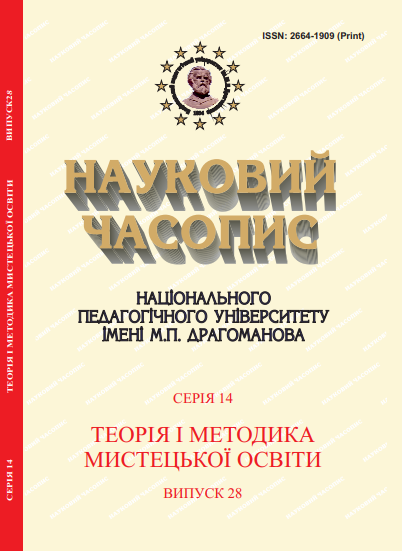Axiological concept of artistic education of students of art faculties
DOI:
https://doi.org/10.31392/NPU-nc.series14.2022.28.02Keywords:
future music teachers, axiological concept, professional training, theory of valuesAbstract
The purpose of this publication is the theoretical and methodological substantiation of the axiological concept of professional training of students of the faculties of arts. It is advisable to consider the problems of modern art education from the angle of the value attitude of students of the faculties of arts to the perception of works of musical art in their axiological essence. The subject-structural analysis of the studied phenomenon determines the specification of the essence and content of the axiological concept of professional training of future music teachers. Solving the problem of effective axiological development of future music teachers is closely related to the degree of development of their professionalism and the effectiveness of performing productive activities of the students. That is why the axiological concept of education acquires a paradigmatic significance in terms of its content, which allows solving urgent tasks in the field of art education. The article reveals the features of the axiological concept of artistic training of future music teachers. The possibilities of wide use of the axiological concept in the educational process of future teachers of musical art have been revealed due to the direction of its content, forms and methods to the formation of high-quality professional preparation for productive activities with students based on the organic system of value orientations. It has been found that the value attitude in the process of mastering art is the basis for preparing an individual for co-creation. The basis of the understanding of this process is the understanding of the value attitude towards works of art as a characteristic feature of the creative activity of an individual, which is the basis of the implementation of subject-object relations in practical activity. It is distinguished that artistic and musical values are the result of spiritual mastery of the personality by works of art, awareness of their content, aesthetic form, implementation of a deep musical and pedagogical analysis of works of art.
References
Авдієвський А.Т. (1996), Формування особистості на ґрунті національно-культурного відродження. Мистецтво у школі: зб. ст., упор. І.М.Гадалова. К.: УДПУ. Вип. І. С. 80-83.
Алексюк А.М. (1998), Педагогіка вищої освіти України. Історія. Теорія: підручник для студ. і викл. вищ. навч. закл. К.: Либідь, 1998. 558, [1] с.
Андрущенко В.П. (2004), Про концептуальні засади філософії освіти. Нова парадигма: альманах наук. праць. К., НПУ імені М.П. Драгоманова. Вип. 36. С. 8-20.
Анциферова Л.И. (1974), Развитие и современное состояние зарубежной психологии. М. С. 34-54.
Асмолов А.Г. (2001), Психология личности: Принципы общепсихологического анализа. М.: Смысл. 416 с.
Бех І.Д. (2018), Особистість на шляху до духовних цінностей: монографія. Київ-Чернівці: «Букрек». 320с.
Вітвітська С.С. (2015), Аксіологічний підхід до виховання особистості майбутнього вчителя. Креативна педагогіка. №10. С. 63-67.
Гончаренко С.У. (2011), Український педагогічний енциклопедичний словник. Вид. 2-ге. Рівне: Волинські обереги. 552 с.
Зязюн І.А., Сагач Г.М. (1997), Краса педагогічної дії: навч. посіб. для вчителів, аспірант., студ. К.: Українсько-фінський ін-т менеджменту і бізнесу, 1997. 302, [1] с.
Kozyr A., Labunets V., Pankiv L., Liming W., Geyang Zh.: (2020), Methodological Aspects of Modernization of Professional Training of Future Music Teachers. Utopia y Praxis Latinoamericana. Revista Internacional de Filosofia y Teoria Social. Universidad del Zulia-Venezuela. Vol. 25. 2020. pp. 370-377.
Мойсеюк Н.Є. (2001), Педагогіка:навч. посіб. 3-є вид., допов. К. : ВАТ «КДНК». 608 с.
Костюк Г.С. (1989), Навчально-виховний процес і психічний розвиток особистості. К. : Рад. школа. 608 с.
Орлов В.Ф. (2003), Професійне становлення вчителів мистецьких дисциплін: теорія і технологія: монографія за заг. ред. І.А. Зязюна. К. : Наукова думка. 262 с.
Падалка Г.М. (2008), Педагогіка мистецтва (теорія і методика викладання мистецьких дисциплін). Київ : Освіта України. 274 с.
Рудницька О.П. (2005), Педагогіка загальна та мистецька: навчальний посібник. Тернопіль : Навчальна книга Богдан. 360 с.
Сластёнин В.А. (2000), Педагогика: учеб. пособ. для студ. пед. учебн. заведений.В.А. Сластёнин, И.Ф. Исаев, А.И. Мищенко. М. 423 с.
Navickienyo L.(2001), Emocinio Imitavito Metodas. Vilnus, 2001. 128 p.
Ruszkowski J., Gornics E., Zurek M. (2004), Leksykon integracji europejskiej. Warszawa: Wydawnictwo naukowe PWN. 636 s.
SengeP. (1990), The Fifth Discipline, NewYork, Doubleday. Р. 95-146.
Willoygby D. (1996), The World of Musik. Third ed. Boston : MacGraw-Hill. 381 р.
Downloads
Published
Issue
Section
License
Copyright (c) 2022 Nauk. čas. Nac. pedagogìčnogo unìv. ìm. M.P. Dragomanova, Ser. 14, Teor. metod. mistec. osv. [Scientific journal NPDU. Series 14. Theory and methodology of arts education]

This work is licensed under a Creative Commons Attribution-NonCommercial-NoDerivatives 4.0 International License.

